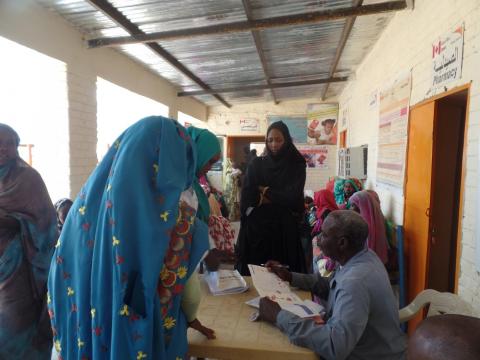World Vision contributes to bridging the gap in universal health coverage in Sudan

By Gamal Ghallab, WV Sudan communications officer
South Darfur, Sudan- This year’s World Health Day (WHD) focuses on Universal health coverage (UHC) for everyone, everywhere, however persistent challenges such as poverty, insecurity, and underfunding in healthcare system deprive millions access to the much needed services.
As is the case with 22-year-old Neimat, a mother of three children from Timbisco, in South Darfur. Slightly a month ago Neimat could have bled to death giving birth to her youngest son Salah Addin Mohammed. Luckily, a trained midwife and other medical personnel at the local health facility were on hand to prevent that from happening.
While at home recuperating and caring for her baby, Neimat’s weight began to decline but she couldn’t visit the health facility just yet. Traditionally in Sudan, a woman cannot leave the home during the first 40 days after delivery, not even if it was a matter of life and death. This period, known as the Nifas is believed to be important for the mother to devote all her time to her newborn baby.
Again, Neimat had her stroke of luck. Ahmed, a World Vision nutrition assistant says eventually she wouldn’t be able to produce enough milk to feed her baby. At the Timbisco clinic Neimat received nutrition care in the form of Ready-to-use Therapeutic Food (RUTF) meant to help her regain her lost weight.
The clinic, managed and supported by World Vision, is a reprieve for people like Neimat –a housewife-without the financial means to afford to pay for healthcare. Here they have access to a full range of free and quality services such as consultation, laboratory testing, routine immunisation, nutrition care as well as health education.
Pregnant women have access to an adequately equipped maternity unit complete with a delivery ward where they receive Basic Emergency Maternal Obstetric and Neonatal Care (EMNOC) with the help of a skilled midwife.
Sayda al Doud is the midwife at the Timbisco clinic and she has assisted mothers deliver safely for eight years. “Even though some mothers still deliver at home with the help of elderly women, with increased awareness that we conduct both here at the clinic and in the communities –with the support of our trained health workers- about the services available I have noted a preference in mothers wanting to deliver at the health facility,” Sayda explains. “And for the mothers who have delivered here, they go back to the communities and share their experiences, that too influences other mothers to opt for health facility delivery,” she adds.
According to Yassir Yahya Tibin, head of Primary Health Care department at the South Darfur State Ministry of Health (SMoH), NGOs are playing a huge role in supporting the Government to bridge the Universal Health Coverage gap by either managing or supporting some of the health facilities. “World Vision currently contributes to providing 85 per cent of primary health care services to the populations in all its operational areas,” he notes.
World Vision’s contribution has been largely through establishing health facilities in areas where they are non-existent or where there is greater need. In 2018, World Vision managed or supported 27 clinics in the entire of South Darfur, an increase from 10 in 2017.
Timbsico clinic is part of a project funded by Global Affairs Canada (GAC) assisting at least 241,786 people across eight localities in South Darfur –a majority of them displaced by conflict- access quality health care services. It is through this funding that World Vision is able to equip these health facilities with medicines and equipment including staffing with trained healthcare personnel often seconded from the State Ministry of Health.
“It is good that we have a facility like this one nearby where we can run to when we need help,” 25-year-old Fatima Abdallah, a mother of two says. When she suspected her two-year-old girl might have malaria because she had been vomiting, Fatima quickly dashed to the clinic just a few miles away. It was a huge relief when the test results turned out negative.
“Often times when there’s vomiting and a fever we conclude it is malaria, but now we can go to the clinic where we have trained medical personnel to conduct the necessary tests to be completely,” Fatima says.
Despite persistent challenges such as underfunding, insecurity in certain areas that limit access, as well as shortage of trained health workers, clinics such as Timbisco is a source of hope in achieving the target of quality health services for everyone everywhere.
The Government of Sudan has allocated 8% of its budget towards healthcare.